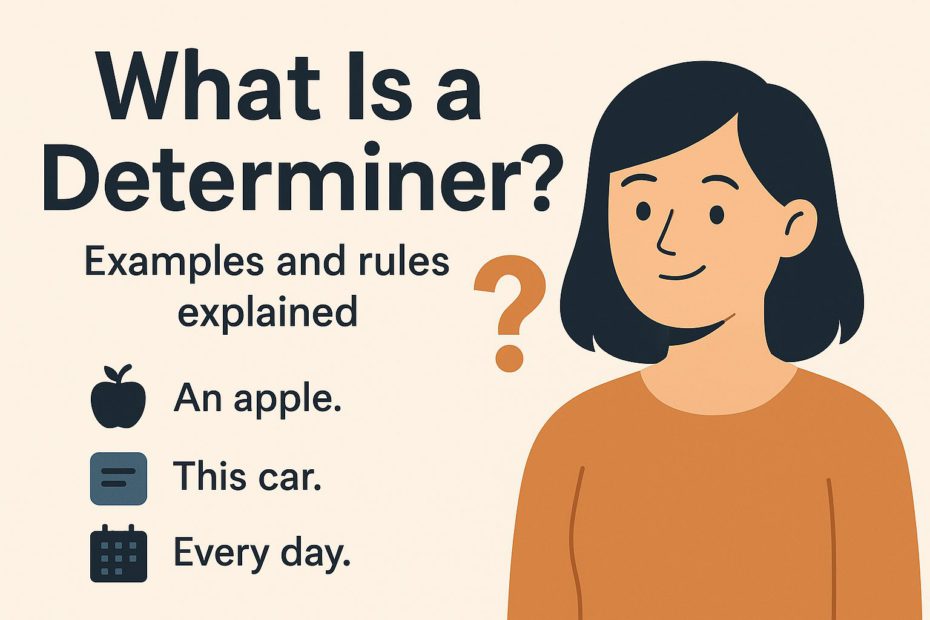In English grammar, determiners are essential building blocks that appear before nouns. They help specify which one, how many, or whose noun we’re talking about. Without determiners, sentences can become vague, confusing, or even grammatically incorrect.
Whether you’re a student, writer, or non-native speaker, mastering determiners will sharpen your understanding of sentence structure and boost your communication skills.
🔍 What Is a Determiner?
A determiner is a word placed in front of a noun to clarify what that noun refers to. It helps answer key questions such as:
- Which one?
- Whose is it?
- How many?
- Is it specific or general?
Determiners are important because they narrow down the meaning of nouns, allowing the reader or listener to grasp exactly what is meant.
🧾 Examples of Common Determiners:
- Articles: the, a, an
- Demonstratives: this, that, these, those
- Possessives: my, your, his, her, its, our, their
- Quantifiers: some, any, many, few, all, no
- Numbers: one, two, ten
- Distributives: each, every, either, neither
- Interrogatives: which, what, whose
📍 Where Do Determiners Go in a Sentence?
Determiners usually appear before the noun or noun phrase they modify. Typically, determiners appear at the start of a noun phrase.
✅ Examples:
- This car is fast.
- A child was playing outside.
- My sister lives in Canada.
Occasionally, determiners are followed by adjectives that describe the noun.
Example: That beautiful painting hangs in the gallery.
📂 Types of Determiners (With Examples)
In English, determiners fall into a few main categories, each serving a distinct purpose. Each has a unique function and helps clarify different aspects of the noun.
1. 📘 Articles
Articles show whether a noun refers to something specific or something more general.
- Definite Article: the – used when referring to something known or previously mentioned. I watched the movie you recommended.
- Indefinite Articles: a, an – used for nonspecific or general references. She adopted a puppy.
He ate an apple.
Note: Use a before words that start with a consonant sound, and an before words with a vowel sound.
2. 👈 Demonstrative Determiners
These point to specific things in relation to the speaker’s position.
- Examples: this, that, these, those This chair is more comfortable than that one.
Those books belong to the library. - Use “this” and “these” for nearby items, and “that” and “those” for things farther away.
3. 💼 Possessive Determiners
These indicate ownership or relationship.
- Examples: my, your, his, her, its, our, their Her bag is on the chair.
Our vacation was amazing.
Don’t confuse these with possessive pronouns like mine or theirs, which do not come directly before a noun.
4. 🔢 Quantifiers
Quantifiers express quantity, whether it’s countable or uncountable.
- Examples: some, many, few, several, all, no, enough Many people attended the seminar.
He had no money left.
Some students didn’t show up.
Some quantifiers are used with countable nouns like “many apples,” while others fit uncountable nouns like “much water.”
5. 🔣 Numbers as Determiners
Cardinal numbers act as determiners when placed before nouns.
- Examples: one, two, five, ten, etc. She bought three apples from the market.
We saw two birds on the fence.
They specify exact quantity, unlike general quantifiers.
6. 🎯 Distributive Determiners
These refer to individual members of a group and emphasize separation or individual attention.
- Examples: each, every, either, neither Each child received a gift.
Neither option appealed to me.
Tip: Each refers to individuals separately, while every refers to the group as a whole.
7. ❓ Interrogative Determiners
Used to ask questions about nouns.
- Examples: which, what, whose Which shirt do you like best?
Whose car is parked outside?
They are always followed by a noun.
⚠️ Common Mistakes with Determiners
Many learners confuse determiners or leave them out entirely. Let’s look at a few examples:
| ❌ Incorrect Sentence | ✅ Correct Sentence |
|---|---|
| She gave me book. | She gave me a book. |
| I want apple. | I want an apple. |
| I don’t have any the answers. | I don’t have any answers. |
Remember:
- Don’t use two main determiners before the same noun.
(e.g., the my book ❌ → my book ✅)
🧠 Tips for Mastering Determiners
- Pay attention to countability.
Use many, few, several with countable nouns, and much, little with uncountable nouns. - Be mindful of specificity.
Use the when referring to something known or previously mentioned. - Don’t double up.
Only one main determiner should appear before a noun (e.g., their the house is incorrect). - Practice with real examples.
Read books, articles, and dialogues to see how native speakers use determiners naturally. - Watch out for adjective order.
Determiners always come before any adjectives: This red car, not Red this car ❌
🎓 Conclusion: Why Determiners Matter
Though often short and easy to overlook, determiners are fundamental to sentence clarity in English. They help identify what exactly you’re talking about, how many things are involved, and who owns them.
Understanding and correctly using determiners will improve both your writing and speaking, making your communication more polished and precise.
So the next time you say “a dog” or “those apples”, remember—you’re using determiners like a grammar pro! 💬

